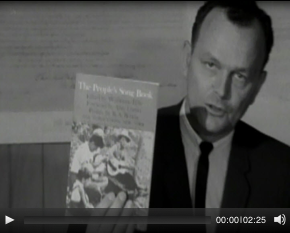In the 1950s, several Americans who worked in the public sphere were under attack from United States Senator Joseph McCarthy during a time known as the Second Red Scare. Attempting to rid American media and entertainment of any trace of Communist sentiment, Senator McCarthy blacklisted writers, actors, and musicians who were suspected of Communist allegiance or sympathy. Anxiety over Communism lasted well into the 1960s, and one such victim of late McCarthyism was folk singer Pete Seeger in 1963. In the video below, former Governor Gordon Browning speaks at a press conference about Seeger’s suspected alliance with the “Communist Conspiracy” to warn folk music consumers of this potential “threat” to American entertainment.
Seeger’s alignment with populist / socialist sentiment and his incorporation of it into music was no secret. He had been a member of the Communist Party from 1942-1949, and he was a founding member of The Weavers, a folk group that performed songs like “Talking Union”1 at workers strikes and other such political events until McCarthy blacklisted the group in 1953. Just two months before the 1963 press conference, Seeger released his album “We Shall Overcome” which featured songs that aimed to rally supporters of the Civil Rights Movement. That Seeger’s music was political is undeniable.2
However, Browning brings up an interesting point when he says:
Folk singing, for hundreds of years, has been a highly respectable art, and a very wonderful form of entertainment, and now we are concerned that the Communists are moving into this field and that they are going to pervert this wonderful form of entertainment so it will satisfy their own needs.3
Were folk revivalists, as Browning believes, using folk songs for political causes they were never meant to support, or has folk music always belonged to populist / socialist causes? In some ways, both are correct. It is certainly true that folk revival songs like “Talking Union” had more overtly political messages than traditional folk ballads like “Barbara Allen:”
Was in the merry month of May
When flowers were a-bloomin’
Sweet William on his deathbed lay
For the love of Barbara Allen
Slowly, slowly she got up
And slowly she went nigh him
And all she said when she got there
“Young man, I think you’re dying”
“O yes I’m sick and very low
And death is on me dwellin’
No better shall I ever be
If I don’t get Barbara Allen”4
Yet, folk ballads such as “Barbara Allen” often addressed universal themes like love and played important roles in rural, often poor and oppressed communities like those in Appalachia. While traditional folk song did not always directly encourage political activism like songs of the folk revival movement did, they represented the common person. So, Browning was not mistaken in noticing the overt political messages in folk revival music that were absent in earlier folk music, but he was wrong to assume that traditional folk music did not support the same sentiments that the Leftist songs of the folk revival movement did.
Footnotes
1“Talking Union,” Youtube video, posted by farmboy10001, December 8 2010, https://www.youtube.com/watch?v=osnjAb-hoPo
2“Seeger Pete.” In Encyclopedia of Popular Music, edited by Larkin, Colin. : Oxford University Press, 2006. http://www.oxfordreference.com/view/10.1093/acref/9780195313734.001.0001/acref-9780195313734-e-25192.
3Gordon Browning, “Folk singers linked to alleged ‘Communist Conspiracy,’ Popular Culture in Britain and America, 1950-1975, 2:25, August 19, 1963, http://www.rockandroll.amdigital.co.uk/video/videodetails.aspx?documentId=664253&videoSearch=Pete+Seeger
4“Ballad of America.” Barbara Allen (American Folk Song). Accessed March 8, 2015. http://www.balladofamerica.com/music/indexes/songs/barbaraallen/index.htm.
